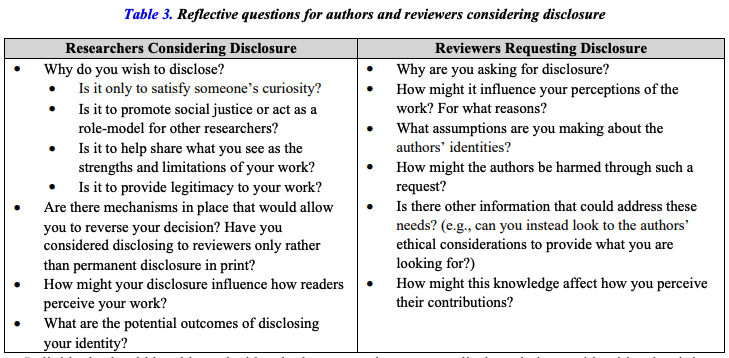Excited to share a preprint of our upcoming TOCHI paper titled "Embracing Four Tensions in Human-Computer Interaction Research with Marginalized People" with @smunson and @juliekientz. A brief (but not so brief) thread of our findings: 
https://calvliang.github.io/projects/TOCHI2021

https://calvliang.github.io/projects/TOCHI2021
Motivated by a growing interest in marginalization in HCI, the potential for harm and/or good of technical systems, and a greater awareness that researchers can be marginalized, we asked "How do HCI researchers engage in and reflect on research with marginalized people?"
We collected qualitative data from 24 HCI researchers who had experience working with marginalized people through either a survey, interview, or both. We asked about their personal approaches to research, their successes, their hard lessons, and more!
An important thing to note is that a majority of the voices represented in this study are based in the US, which definitely skews the data and our analysis. We hope that readers keep that in mind when interpreting our work!
Through a reflexive thematic analysis, we constructed themes and grouped them by 1) researcher to participant interactions, 2) researcher to researcher interactions, and 3) structural interactions, or HCI to researcher to participant.
For each, we present resulting harms and things that participants in our study did to mitigate such harms. ex: "Tokenization & asking invisible labor of researchers w/ marginalized identities" and "Balancing harms and benefits of reflexivity and positionality statements"
Through this, we identified four tensions inherent to working with marginalized people in HCI: exploitation, membership, disclosure, and allyship. This is not meant to be a definitive list by any means, and each is very very complex. Here's a quick rundown:
Tension 1 - Exploitation: Research is inherently an exploitative process and we may never give back to participants as much as we take. Also, tokenizing researchers for their marginalized experiences is bad but some marginalized researchers felt they had no other choice but to be
tokenized to ensure work would be done with care. One way we might think about preventing exploitation is limiting who can do what research based on identity, but we demonstrate why this is not good, which leads us to...
Tension 2 - Membership: People with shared experience/identity as participants in research have authority over their experiences, but it does not guarantee that work will be done with care. If we require shared membership to do work with marginalized people, this reproduces
marginalization. Also, given intersectionality and the axes of oppression, what does shared experience even mean and what can/cannot it grant researchers? This does not mean that researchers who don't have shared identity with participants have free access, but can we evaluate
that work was done with care based on positionality AND the ethical considerations the researcher made (instead of solely identity)? Membership based judgements also requires knowing people's identities, but it is harmful to require people to out themselves.
Tension 3 - Disclosure: reflexivity and positionality statements are really hot in HCI research right now and they can be helpful in communicating biases, but they unfortunately have led to unwelcome requests for author disclosure of their identities.
This even happened in reviews of this paper! So meta. We're obsessed with knowing details about author identity, sometimes for good reasons. But! forcing people to out themselves so their work can be accepted or perceived as more valid reproduces marginalization of researchers.
Choosing to decide whether to disclose or not should be the author's decision, removed from reviewer, advisor, or other outside pressures. We created this table of reflective questions for researchers thinking about disclosure and reviewers thinking about asking for disclosure.
Tension 4 - Allyship: Not all research that claims to be allyship is allyship and, simultaneously, all research should be allyship. In its most ideal form, allyship leverages power for good, and this is something that should drive HCI research with marginalized people.
Here, we draw heavily from lessons from the previous three tensions, criticisms of allyship in literature, and the work of activists including allyship guides from several activist groups. We make a call for an allyship-oriented paradigm of HCI research,
one that is explicitly in opposition to systems of oppression and asks individual researchers to engage in a constant cycle of critical self-reflection.
An important limitation of this work is that we look at marginalization in such a wide sense that we miss localized ways that these tensions play out specific to forms of oppression like race, class, gender, sexuality, age, ability, and more. However, we hope that researchers can
explore, engage with, and even challenge these tensions. Finding clarity in these four areas, though, is an important step towards a more equitable, justice-oriented way forward for HCI.
If you can believe it, this twitter thread does not come close to capturing the nuance involved in this project. I haven't written and re-written this thing for a year for nothing! I invite you to read the full paper and I am happy to engage in any conversations along the way 

A final note to thank the really incredible people involved in this project. The people who participated in this study, the people who gave feedback and read too many drafts, and the people I've gotten to cite have all had an immense role in shaping my own academic growth. 

This has been a huge labor of love, and I am excited to move forward in thinking about the relationship between research and allyship in HCI. Look out for followup work in the future!

 Read on Twitter
Read on Twitter


